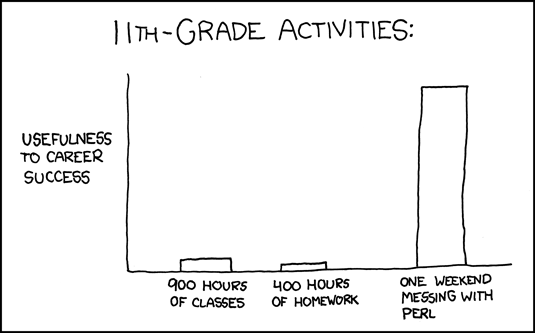Messing around
« previous post | next post »
The latest xkcd:
The mouseover title: "And the ten minutes striking up a conversation with that strange kid in homeroom sometimes matters more than every other part of high school combined."
Perl didn't exist forty years ago, but the time that I spent messing around with the PDP-9 in Ken Stevens' lab at MIT certainly influenced the rest of my life, even though it had nothing directly to do with any classes or grades. The informal "minimum number of instructions to calculate a square root" contest had an especially big impact, even though it was way less professionally relevant than the primitive audio waveform editor that I actually succeeded in writing.
If you've got a free weekend or two, you could do a lot worse than to spend some time messing around with Python and NLTK — there's even an online book to guide you.
[Update: I note in passing that web search for "mess(ing) around with" turns up at least three classes of continuations: sex partners ("her best friend", "married women", "a guy that has a girlfriend"); technologies ("metadata", "the ASUS Eee PC", "your X Server"); and agents of potentially violent retaliation ("Jim"). In contrast, plain around-free "mess(ing) with" seems to be much more strongly biased towards the risk-of-retaliation idea. Maybe Randall Munroe left out "around" due to label spacing issues, or maybe he just thinks of "mess with" in a more harmonious sense. Or maybe the career-success value of "messing with Perl" was in fact due to the propensity of Perl to mess right back at you. ]

speedwell said,
December 19, 2008 @ 11:37 am
And two minutes of a 40-year-old reading a language blog and saving the link to the book as a favorite may matter more than the rest of the degree she didn't get back in the 80s. Thanks :)
Eli said,
December 19, 2008 @ 12:04 pm
Or grab O'Reilly's Learning Perl (the "Llama Book") and start learning Perl. It's still relevant today, and is quite useful.
Martyn Cornell said,
December 19, 2008 @ 12:11 pm
Three years of a part-time MBA, and the most useful part was the two evenings learning how to use an Excel spreadsheet …
kmurri said,
December 19, 2008 @ 12:13 pm
I was wondering who Perl is and whether she'd be fun to mess with.
Guess we know where my priorities are.
Jane said,
December 19, 2008 @ 12:17 pm
About 6 months ago, I spent a free weekend messing with Python and NLTK. I ended up with a little program that takes a nonfinite Spanish verb as input and spits out conjugated forms. Ever since then, I spend most of my time at work (which is, unfortunately, not related to linguistics or programming) dreaming about the grand translation programs I would surely be capable of engineering if only I had more free weekends. Alas, time is difficult to come by :(
Anyways, if anyone out there is interested in collaborating on a Spanish/English translation program with a total newb to programming, send me an email and let's get started! – lapham.j@worldnet.att.net
Dave Richards said,
December 19, 2008 @ 12:19 pm
And there I was expecting to read how the verb "matters" doesn't agree with the subject "10 minutes". Python is incredibly useful to know. Great for everything from renaming lots of files quickly to building a better Excel.
Faldone said,
December 19, 2008 @ 2:25 pm
@ Dave Richards
I believe, in this context, ten minutes is singular. Unless you are spending one minute each on ten distinct tasks.
Pekka said,
December 19, 2008 @ 2:27 pm
In case you are having trouble downloading a certain file from the download page, that is because the link has a wrong version number. You can find the proper file from the Google Code site if you follow the links via the NLTK main page. I have sent an e-mail pointing this out and I hope they will correct it soon.
MM said,
March 15, 2009 @ 4:04 am
I am finding this Python very heavy going. Am going to have to start at the beginning again after getting part way through Chapter 2 in more than a couple of weekends. I understand that some of the exercises are to be understood and others not. But I have no idea of the meaning of some of the elementary error messages, relating to what I'm looking for, where I probably have not downloaded the stuff although I had it last time I tried, and neither Google, the users' group at NLTK (which is over my head) nor the O'Reilly book Learning Python (the rat on the cover I picture as myself, the victim) help there, so there is a high frustration level. But I think starting again may help. I want to get an idea of whether it'll be more use to me than using concordance software in analysing legal texts.
Messing Around : Learning Creative Learning p.6 | @DDRRNT said,
February 16, 2013 @ 10:17 am
[…] Image via: http://languagelog.ldc.upenn.edu/nll/?p=926 […]